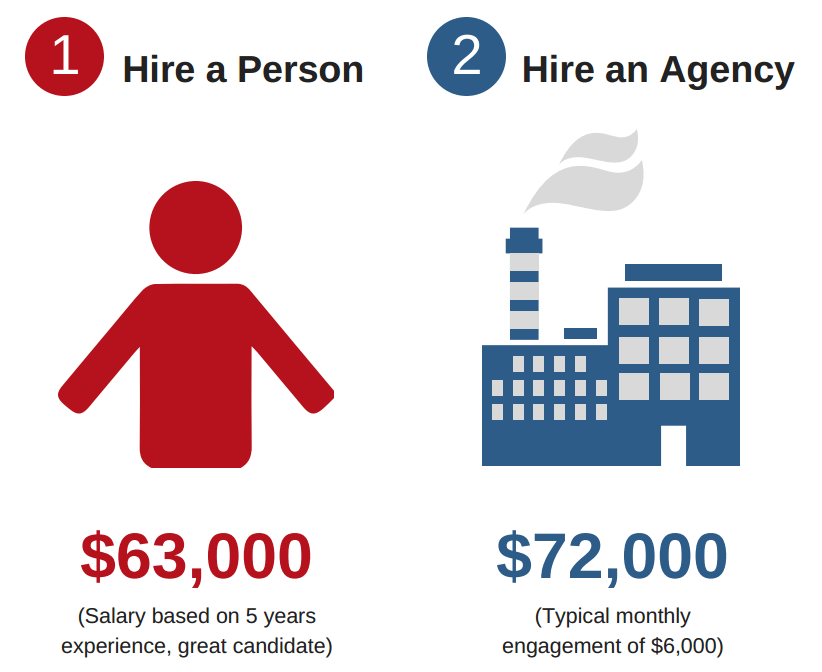What does SEO Cost? Pros and Cons of Outsourced Online Marketing?
So, you’ve finally come around and figured out that this internet thing is a good way to bring in some business. Maybe you’ve brushed up on some SEO education and have a decent idea how to set up your site and bring a little traffic your way.
Now it’s time to ramp things up a little bit. Your first thought is to hire a 22-year old and show them the ropes. You can put her to work for pretty cheap and handle everything in-house. Sounds like a plan.
We can’t dispute it’s a plan, but is it the best one?
Let’s walk through the logic of hiring in-house vs. going with an agency to take care of your online marketing work.
Let’s Start with What you Need…
You’re in charge of marketing, and that’s a huge job. Success is pretty hard to measure and there’s a lot of pressure on you. Let’s say you’ve got $100k of annual budget to address the problem. Here are the bullet points you’re probably thinking about:
1. Flow of Content – You’ve figured out that Google doesn’t like static websites. You’ll need to find a way to produce cool stuff regularly to keep your site fresh and interesting. Search engines need to love you.
2. Keyword Research – Great content is of no use unless people are actually looking for it. You’ll need to research what keywords are hot with your prospects and which ones aren’t worth any of your time. Keywords need to be reconsidered all the time as your business evolves and new trends emerge.
3. On-Page SEO – You’ll need to make sure your website is technically optimized for those creepy crawly spiders that search engines use to read your content. Things like headers, meta information, urls, keyword densities, alt tags and other cool tricks to help your site get ranked near the top.
1. What Happens Post SEO – Fast forward the tape to when you’re ranking well and new vistitors are flowing to your website. Now what? What’s their experience like? Where do they take action? Is there any way to know something about them? You need a strategy to help turn these strangers into customers beyond a phone number to call or a “contact us” form. How about generating some real leads?
2. Keeping in Touch with Past Prospects – After days, weeks and months go by, a bunch of people have come to your site and forgotten about you. If they were interested at some point, for one reason or another, they decided to move on and never pull the trigger. You might need some kind of lead nurturing strategy to keep these guys engaged a little bit and stay top of mind.
3. Tapping into Existing Customer Base – What about leveraging your current happy customers? SEO doesn’t do this at all. You ought to consider efforts toward turning your customers into promoters of your brand. More email nurturing is a great way to do this…continually over delivering value to your current customers means they’ll recommend you to their networks.
All the strategies go well beyond SEO. They fall under the Inbound Marketing umbrella.
Here are your two choices…and estimated costs:
Hiring in-house wins, right?
Not so fast…
We’re not comparing apples to apples just yet.
…But let’s Think Total Cost
The cost of hiring and retaining an employee is much more than base salary. Here are some things we need to add in to figure out the total cost of a new hire:
Benefits
Health insurance, 401(k) and Paid Time Off account for an additional 35% of base salary, or $22,050.
Overhead
They’ll need some space to work in (rent), furniture, computer, software licenses, snacks and free coffee. That’s an additional 25% of base salary typically, or another $15,750.
Administrative
You’ll have some extra accounting, legal fees, liability insurance and some corporate taxes. Add on another 18%, or $11,340.
Training
Normally, it’s 6 – 9 months of salary to onboard new team members and get them trained up, but let’s call it 3 months: $15,750
And we’re still not there…
Turnover
Over 90% of millennials see themselves sticking at the same job less than 3 years.
You’re probably not looking for a 45-year old to fill this role in your company. Finding someone with 5 years of experience means you’re probably thinking of someone in their mid-20’s. This bunch is notorious for really high rates of turnover.
This means you’ll be starting over in just a few years. You’re taking on all the cost and all of the risk.
Productivity
The average worker is producing only 60% of the time.
Figure in all the social media checks, long lunch breaks, water cooler talks, and sicknesses that come around when the surf’s up.
Agencies spread the work around to many different people. Instead of one person working for 40 hours per month, they might have 8 people each putting in 5 specialized hours. Also, typical contracts will lay out specific deliverables rather than a number of hour to work. If the agency staff isn’t productive, it’s their problem.
And here are the biggest caveats of them all…
Aptitudes
An agency’s cumulative skill set is many times what your best employee could ever bring. With a good agency, you’ll have a full entourage of diverse skill sets working on your behalf. You’ve got an SEO Specialist, Creative Director, Graphic Designer, Writers and Editors, Research, Data Analyst, Programmer, and Project Manager to coordinate it all.
Software Licenses
Beyond the people at the agency, you’re effectively tapping into all their software licenses, libraries of shared content and many years of trial and error experience.
Scaling
Forget all the other stuff, we’ve been comparing a single person to an entire team of professionals.
With outsourced online marketing, you can ramp up or tone it down at the drop of a hat. When you figure out that your blog is catching fire, a good agency will not only help you recognize this in the first place, but they’ll suggest redirecting resources from other areas to crank out more posts for you. Little Johnny-New-Hire can only research and write so much.
Beyond that, when it comes time to grow your efforts across all channels, you’ll be able to make adjustments on very short notice with an agency engagement.
On the other side, you’re limiting your risk substantially. Whatever the exit clause is in your agency contract, it’s going to be easier than firing staff and filling in the holes.
Conclusions
I get that comparing these two options on a cost basis can be a challenge. There’s a lot to consider, especially if this is new territory for you.
Here are a couple other things you might consider:
Agencies like ours can hire the best SEO and Inbound Marketing talent before you can. Why? Because they’d rather be here with a wide range of clients, guaranteed work, and unique challenges. They’d rather be a part of a team with clear direction, success formulas, and plenty of flexibility for them to experiment and test things out. Sorry, but there are things we can offer them that non-agencies just cannot.
As you consider the merits of outsourcing online marketing, you’re taking on some level of risk either way. Don’t get too hung up on cost. There’s no comparison between cheap services that don’t work versus killing it with expensive retainers. Of course, always negotiate the best arrangements you can, but I encourage you not to get too hung up on price.
Here’s the Take Away…
• Agencies will cost more per hour
• An employee will do more work per year
• An agencie carries less risk and ability to scale
• There is no substitute for the breadth of competency in a good agency
Good luck.




